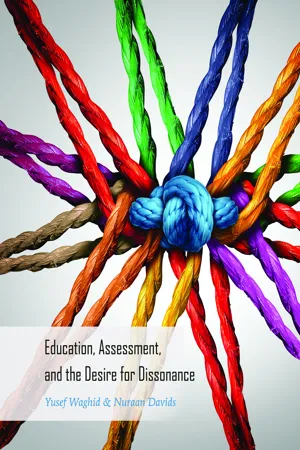
- 166 pages
- English
- PDF
- Available on iOS & Android
Education, Assessment, and the Desire for Dissonance
About this book
Education, Assessment, and the Desire for Dissonance aims to address the contentious practice of assessment in schools and universities within a poststructuralist educational paradigm. Within the theoretical paradigm of Foucault's (1994) notions of governmentality, subjectification and dissonance, the book examines why, through which and in which ways (how) educational assessment should unfold considering the challenges of globalized and cosmopolitan dimensions of educational change that have beset educational institutions. Waghid and Davids show how conceptual derivatives of Foucauldian governmentality, in particular the notions of power, panopticon and surveillance, dispositive, freedom and resistance—as relational concepts—affect assessment in universities and schools. The authors argue why universities and schools cannot be complacent or non-responsive to current understandings and practices of assessment. In the main, the authors contend that a Foucauldian notion of powerful, subjectified and dissonant assessment can, firstly, be extended to an Agambenian (2011) notion of a profane, denudified and rhythmic form of assessment; and secondly, be enhanced by a Derridian (1997) idea of friendship that bridges a Foucauldian view of governmental assessment with an Agambenian view of ethical assessment. Friendship allows people to act responsibly towards one another—that is, teachers and students acting responsibility towards one another—and resonates with an ongoing pursuit of rhythmic assessment practices. Such a form of assessment opens up an attentiveness to the incalculable and unexpected encounters that bear the responsibility of acting with one another. The authors conclude that an assessment with teaching and learning can transcend the limitations of an assessment of learning and an assessment for learning.
Tools to learn more effectively

Saving Books

Keyword Search

Annotating Text

Listen to it instead
Information
Table of contents
- Cover
- Table of Contents
- Acknowledgements
- Foreword by Tukumbi Lumumba-Kasongo
- Preface
- Chapter 1. Governmentality and Assessment Practices in Neoliberal South African Educational Institutions
- Chapter 2. Educational Assessment and Power
- Chapter 3. Panopticism and Assessment
- Chapter 4. Towards Foucauldian Agonism in Assessment
- Chapter 5. Against Metrics and Measurement: A Foucauldian Perspective
- Chapter 6. Foucault and Discourse Analysis
- Chapter 7. Dissonance and Educational Assessment
- Chapter 8. Educational Assessment and Dissonance: Invoking Rhythm, Profanations, and Denudation
- Chapter 9. Bridging Foucault and Agamben: Towards a Derridian Approach of Assessment
- Chapter 10. Teaching and Learning Without Assessment
- Coda on the Ethical Dimensions of Assessment within Teaching and Learning
- Index
Frequently asked questions
- Essential is ideal for learners and professionals who enjoy exploring a wide range of subjects. Access the Essential Library with 800,000+ trusted titles and best-sellers across business, personal growth, and the humanities. Includes unlimited reading time and Standard Read Aloud voice.
- Complete: Perfect for advanced learners and researchers needing full, unrestricted access. Unlock 1.4M+ books across hundreds of subjects, including academic and specialized titles. The Complete Plan also includes advanced features like Premium Read Aloud and Research Assistant.
Please note we cannot support devices running on iOS 13 and Android 7 or earlier. Learn more about using the app